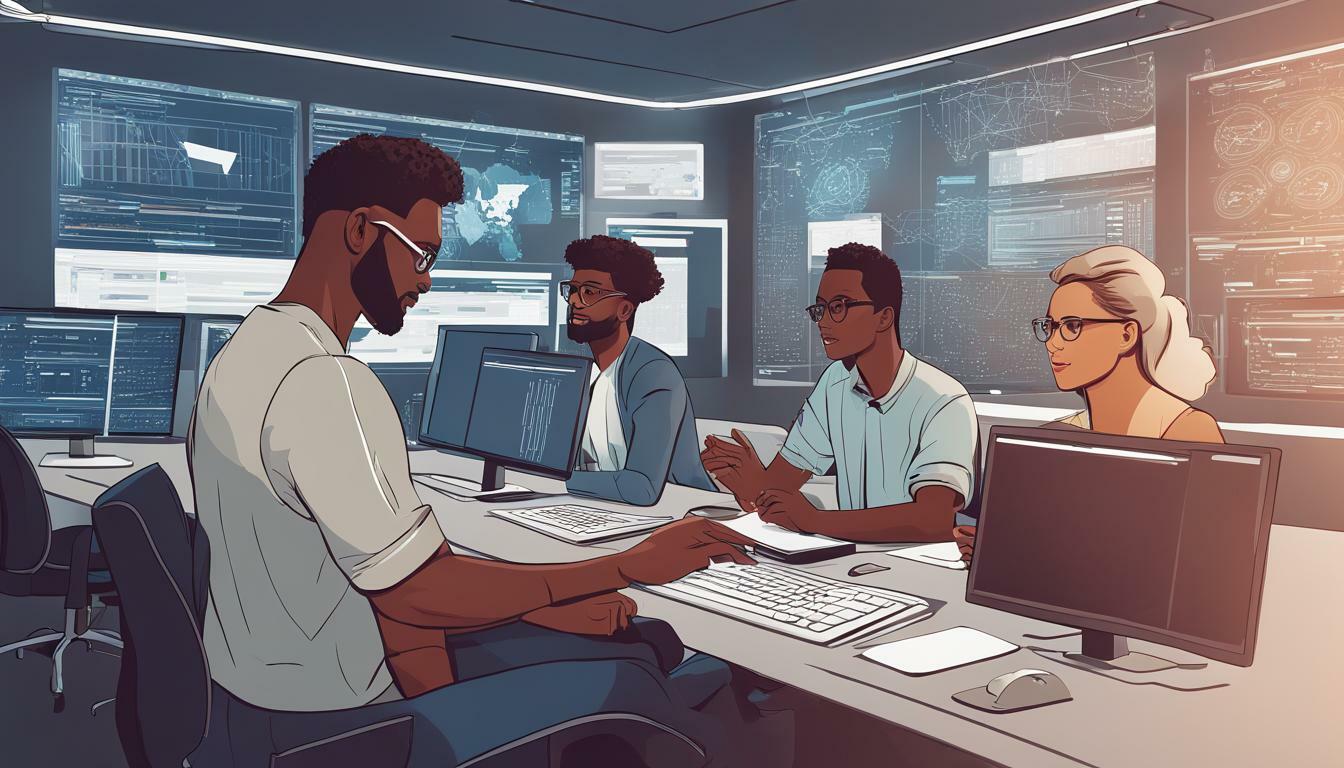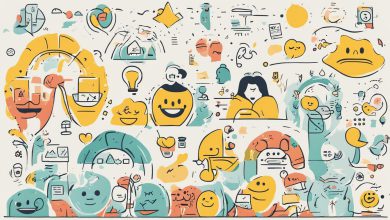
Collaboration is key in software development. As a team player, you’ll play a crucial role in creating high-quality, innovative software that meets users’ needs. But what does it take to become a professional team player in a software development team?
This comprehensive guide will highlight the essential qualities and skills required to become a successful team player, including effective communication, problem-solving, adaptability, time management, continuous learning, and fostering a positive team environment. By embracing these skills and mindset, you can unlock your potential and contribute to the success of your team.
Key Takeaways:
- A professional team player is essential for success in a software development team.
- Effective communication, collaboration, problem-solving, adaptability, continuous learning, and a positive team environment are essential qualities and skills to become a professional team player.
Understanding the Role of a Professional Team Player
Being a professional team player in a software development team requires a combination of skills, attitudes, and behaviors that contribute to the success of the team. As a professional team player, you should possess the necessary technical expertise, but also have the soft skills needed for effective collaboration and communication.
Qualities of a Professional Team Player
A professional team player should have exceptional communication skills, be adaptable and flexible, possess the ability to solve problems, and have a willingness to learn. Good communication skills are essential in a software development team to collaborate effectively and ensure that everyone understands their roles. Being adaptable and flexible is necessary since technology changes, and there are always new approaches to solve problems.
As a professional team player, you must have the ability to solve problems effectively. This involves being a critical thinker with excellent analytical skills. By having the flexibility to work in different situations and learning from past experiences, you will be a valuable addition to any software development team.
Responsibilities of a Professional Team Player
The responsibilities of a professional team player include being responsive to changes, working collaboratively with the team, keeping up with technological advancements, and making sure that the project is delivered on time.
It is your responsibility to stay abreast of the latest technological developments and incorporate them into your work. You should be able to work as a team and support your colleagues, and be open to other people’s ideas. Timeliness is also essential, and as a professional team player, you should prioritize tasks and complete them efficiently.
In summary, a professional team player in a software development team should possess qualities such as good communication skills, adaptability and flexibility, the ability to solve problems, and a willingness to learn. They are also responsible for keeping up with technological advancements, being responsive to changes, working collaboratively, and delivering projects on time.
Building Effective Communication Skills
Effective communication is a vital skill for becoming a successful team player in the software development field. Developers need to be able to articulate their ideas and actively listen to others to achieve project goals efficiently.
Verbal Communication: Verbal communication involves effectively expressing ideas and thoughts through words. It is essential for team members to clearly voice their opinions and explain complex topics in a way that is understandable by all team members.
Written Communication: Written communication skills are crucial for software developers, as they need to create documentation, write code comments, compose emails, and craft technical reports. Clear and concise written communication is vital to ensure that projects progress as planned.
Active Listening: Active listening helps team members understand their colleagues’ viewpoints and identify areas for compromise. By engaging in active listening, developers can demonstrate empathy and gain trust amongst team members.
“Good communication is the bridge between confusion and clarity.”
Clarity of Thought: A team player needs to convey their ideas in a clear and concise manner. Developers must avoid jargon and explain their thoughts logically so that others can follow along. This skill helps them avoid misunderstandings and move projects forward efficiently.
By building effective communication skills, developers can form strong relationships with their colleagues, ensuring that processes run smoothly and that projects are completed on time.
Developing Collaborative Mindset and Attitude
As a software developer, you must work with other team members to achieve success. Thus, it is essential to foster a collaborative mindset and attitude. Collaboration is crucial because it brings together different perspectives, and each team member can contribute their strengths to achieve the common goal. Becoming a professional team player in a software development team requires an attitude of teamwork, cooperation, and conflict resolution. These skills will help you work effectively with other team members, resolve conflicts, and complete projects on time.
Collaboration also facilitates knowledge sharing, allowing team members to learn from one another and develop new skills. By embracing collaboration, you can gain a deeper understanding of your project and contribute to its success.
Benefits of Developing a Collaborative Mindset and Attitude
There are several benefits of developing a collaborative mindset and attitude in a software development team:
- Improved problem-solving skills: Collaborating with team members can lead to innovative solutions.
- Increased creativity: By working with team members with different perspectives, you can generate new ideas.
- Higher job satisfaction: Working as a team can make work more enjoyable and rewarding.
- Enhanced productivity: Collaborating allows team members to work smarter, not harder, leading to more significant results in a shorter amount of time.
To become a professional team player in a software development team and develop a collaborative mindset and attitude:
- Be open to feedback and suggestions from team members.
- Communicate clearly and effectively with team members.
- Be willing to compromise and set aside personal opinions for the benefit of the project and team.
- Contribute to team discussions and offer solutions to problems.
- Respect other team members’ opinions and ideas.
By following these steps and fostering a collaborative mindset and attitude, you can become an asset to your software development team and a professional team player.
Embracing Adaptability and Flexibility
As a professional team player in a software development team, it’s vital to embrace adaptability and flexibility to succeed in this ever-changing field. Being able to handle change, learn new technologies quickly, and work well under pressure are essential skills for becoming a professional in software development.
Software development can be a fast-paced industry, with projects undergoing constant changes. That’s why it’s essential to develop adaptability skills that allow you to adjust to sudden changes in the project’s scope or requirements. Flexibility, on the other hand, involves being open to trying new things and taking on tasks outside your usual comfort zone.
Becoming a professional team player in a software development team also requires the ability to work well under pressure. With tight deadlines and intense workloads, being able to remain calm, focused, and productive is vital. By embracing adaptability and flexibility, you can excel in your role and be an asset to your team.
Mastering Problem-Solving Skills
Problem-solving skills are crucial for becoming a professional team player in a software development team. As a developer, you will encounter a wide range of complex issues that require analytical thinking, creativity, and innovation. The ability to approach challenges with a solutions-focused mindset can set you apart from others and contribute to the success of your team.
Effective problem-solving starts with critical thinking, which involves analyzing the situation, identifying potential roadblocks, and breaking down the problem into smaller, more manageable pieces. From there, you can use your analytical skills to evaluate the situation and develop a strategy for solving the problem.
However, problem-solving isn’t just about analyzing and strategizing. It’s also about finding innovative solutions. Being a creative problem solver means thinking outside of the box and exploring new possibilities. This might involve brainstorming with your team, researching potential solutions, or trying a new approach.
It’s also important to remember that problem-solving doesn’t happen in a vacuum. Collaboration with your team can be a powerful tool for finding solutions. By sharing your ideas and working together, you can leverage the strengths of everyone in the team to find the best possible solution.
To become a master problem solver, it’s essential to continuously learn and expand your knowledge. Keep up-to-date with the latest technologies and industry trends and seek out opportunities to enhance your problem-solving skills. By doing so, you’ll not only become a valuable asset to your team but also set yourself up for a successful career as a software developer.
Enhancing Productivity through Effective Time Management
As a professional team player in a software development team, effective time management is crucial to ensure optimal productivity. Here are some techniques to help you manage your time effectively:
- Set Priorities: Prioritizing tasks can help you stay focused and ensure that important tasks are completed first. Identify urgent tasks and create a schedule to complete them.
- Set Realistic Deadlines: Be realistic when setting deadlines for yourself and your team. Consider the complexity of the task, available resources, and other factors that may impact the timeline.
- Avoid Distractions: Distractions can hinder productivity. Identify potential distractions and take steps to avoid them, such as turning off notifications on your phone or closing unnecessary tabs on your computer.
- Take Regular Breaks: Taking short breaks can help you stay refreshed and focused. Take a few minutes to stretch, walk around, or meditate.
By implementing these techniques, you can enhance your productivity as a professional team player in a software development team and contribute to the success of your team.
Nurturing a Positive and Supportive Team Environment
Working in a software development team can be both challenging and rewarding. As you strive to become a professional team player in this field, it’s important to recognize the significance of creating a positive and supportive team environment. Here are some ways you can nurture such an environment:
Encourage Open Communication
Effective communication is essential in any team environment, and in software development, it’s especially crucial. Encourage your team members to share their ideas, feedback, and concerns in a constructive and respectful manner. Ensure that everyone has the opportunity to express their thoughts and opinions, and make sure to actively listen to what others have to say.
Recognize and Appreciate Contributions
In a team environment, it’s important to recognize and appreciate each team member’s contributions. Celebrate individual and team successes, and acknowledge the hard work and dedication that goes into achieving them. This will help create a positive and supportive atmosphere, boost team morale, and promote a culture of mutual respect and appreciation.
Promote a Healthy Work-Life Balance
Working long hours and dealing with tight deadlines can take a toll on team members’ well-being and productivity. As a professional team player, it’s important to promote a healthy work-life balance. Encourage your team to take breaks, manage their stress levels, and prioritize their personal and professional goals. This will help create a more relaxed and positive work environment.
Deal with Conflict in a Constructive Manner
In any team environment, conflicts are bound to arise. Dealing with them in a constructive and respectful manner is essential for maintaining a positive and supportive team environment. Encourage your team to approach conflicts calmly and objectively, listen to all perspectives, and work together to find a mutually beneficial solution. This will promote a culture of collaboration and cooperation.
By nurturing a positive and supportive team environment, you can promote a culture of collaboration, respect, and appreciation. As you strive to become a professional team player in a software development team, remember to prioritize open communication, recognize and appreciate contributions, promote a healthy work-life balance, and deal with conflict in a constructive manner. These behaviors will help you enhance your skills, contribute to your team’s success, and unlock your potential.
Continuous Learning in Software Development
As the software development field continues to evolve at a rapid pace, it is crucial for aspiring professionals to stay ahead of the curve. Continuous learning is an essential part of becoming a professional team player in a software development team. By keeping abreast of new technologies and trends, you can improve your skills and contribute to your team’s success.
To become a professional team player in a software development team, it is vital to attend workshops or seminars where you can learn new skills and techniques. These events provide excellent networking opportunities and help you stay up-to-date with the latest industry trends. Additionally, taking online courses or pursuing certifications in relevant areas can provide you with a competitive edge and demonstrate your commitment to continuous learning.
Joining online communities and forums can also help you stay up-to-date with the latest industry trends and connect with other developers. These communities provide a platform for sharing knowledge, collaborating on projects, and finding mentorship opportunities. Staying active in these communities also shows your engagement and enthusiasm for the field.
Continuous learning doesn’t just mean learning new technologies but also enhancing skills you already have. Practicing and refining your problem-solving skills, communication skills, and time management skills can help you become a more effective team player. Take the time to reflect on your strengths and weaknesses and seek feedback from your team members or mentors about areas where you can improve.
Ultimately, continuous learning is a critical component of becoming a professional team player in a software development team. By staying up-to-date with the latest industry trends, attending workshops and seminars, joining online communities, and refining your existing skills, you can contribute to your team’s success and advance in your career.
Leveraging Tools and Technology for Team Collaboration
In today’s world of software development, collaboration is a key factor in achieving success. With the advent of various tools and technologies, it has become easier and more convenient to collaborate and work as a team.
Project management software is a great tool for keeping track of tasks and deadlines. With features like task assignments, automated notifications, and progress tracking, it helps to keep everyone on the same page, ensuring efficient output and timely delivery.
Version control systems like Git help to manage code changes and ensure that everyone on the team is working with the same codebase. It enables seamless collaboration on code, reducing the risk of code conflicts and making it easier to troubleshoot errors or bugs.
Communication platforms like Slack, Teams, or Zoom allow team members to communicate and discuss projects, share files, and collaborate in real-time, regardless of their location or time zone. It promotes transparency and open communication among team members, strengthening team spirit and increasing productivity.
Using these tools and technologies can enable teams to work together effectively, resulting in efficient output and timely delivery. However, it’s important to choose the right tool for your team’s needs, taking into consideration factors such as budget, scalability, and user-friendliness.
By leveraging these tools and technologies, becoming a team player in a software development team becomes easier and more effective. Taking advantage of these resources can help you contribute to the team’s success, while simultaneously enhancing your own skills and capabilities.
Conclusion
In conclusion, this guide offers valuable insights on becoming a professional team player in a software development team. By understanding the role, building effective communication skills, embracing collaboration, and continuously learning, you can unlock your potential and contribute to the success of your team.
Remember to nurture a positive and supportive team environment, enhance productivity through effective time management, and leverage tools and technology for team collaboration. Keep in mind that the software development field is continuously evolving, and it’s crucial to stay updated with industry trends and seek opportunities to enhance your skills as a professional team player.
Use this guide as a reference to improve your abilities and deliver exceptional results as a software development team member. With dedication and hard work, you’ll be on your way to becoming a proficient and professional team player in no time.
FAQ
Q: What is the importance of becoming a professional team player in a software development team?
A: Becoming a professional team player in a software development team is crucial because collaboration is essential in this field. Working effectively with others can lead to successful projects and a positive work environment.
Q: What qualities and responsibilities does a professional team player have in a software development team?
A: A professional team player in a software development team should have strong communication skills, adaptability, and problem-solving abilities. They are responsible for collaborating with team members, contributing to project success, and ensuring effective teamwork.
Q: What is the significance of effective communication in a software development team?
A: Effective communication is crucial within a software development team as it promotes understanding, cooperation, and the exchange of ideas. It includes verbal and written communication, active listening, and clear articulation of thoughts.
Q: How can I develop a collaborative mindset and attitude as a professional team player?
A: Developing a collaborative mindset involves valuing teamwork, cooperating with others, and resolving conflicts effectively. It requires embracing the benefits of collaboration and fostering a supportive team environment.
Q: Why is adaptability and flexibility important in a software development team?
A: Adaptability and flexibility are crucial in a software development team due to the ever-changing nature of the industry. Being adaptable allows you to handle change, learn new technologies, and work well under pressure, contributing to team success.
Q: What problem-solving skills are essential for a professional team player in a software development team?
A: Problem-solving skills such as critical thinking, analytical abilities, and the ability to find innovative solutions are essential for a professional team player in a software development team. These skills help overcome challenges and ensure successful project outcomes.
Q: How does effective time management enhance productivity as a professional team player?
A: Effective time management helps prioritize tasks, set realistic deadlines, and manage distractions, leading to increased productivity as a professional team player. It ensures that projects are completed efficiently and on schedule.
Q: Why is nurturing a positive and supportive team environment important in software development?
A: Nurturing a positive and supportive team environment in software development fosters open communication, recognizes team members’ contributions, and promotes a healthy work-life balance. It creates a motivating and collaborative atmosphere for team members.
Q: How does continuous learning contribute to becoming a professional team player in software development?
A: Continuous learning is crucial in software development as it helps professionals stay updated with industry trends, enhance skills, and contribute to their team’s success. Seeking opportunities for growth and attending workshops or seminars can expand knowledge and expertise.
Q: What tools and technologies can be leveraged for team collaboration in software development?
A: Various tools and technologies are available to facilitate team collaboration in software development. These include project management software, version control systems, and communication platforms. Leveraging these tools can streamline teamwork and enhance productivity.








